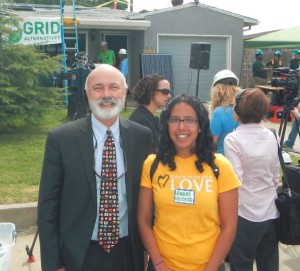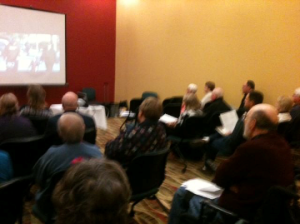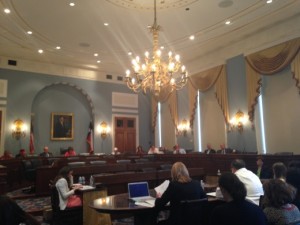Lutherans are taking action across the country! Below you will find our monthly State Advocacy Newsletter. Share with your friends!
Washington, D.C.
Mary Minette,
Interim Director of Advocacy
www.elca.org/advocacy
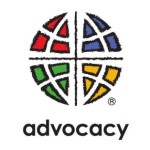 GOD’S WORK. OUR HANDS. OUR VOICES!: “God’s work. Our hands.” Sunday is right around the corner! If your congregation is planning a day of volunteering in your community on Sept. 13, consider advocacy action as one of the ways to put your faith into action! This year, you can help start a letter writing campaign by printing out customizable letters to Congress. These letters will help advocate for justice by educating your representatives about an issue and showing your community’s commitment to compassionate values. Mail your letters to the D.C. Advocacy Office at 122 C Street NW, Suite 125 Washington, D.C. 20001—and we will deliver the letters in bulk to your members of Congress! Click the links below for letters that help support public programs:
GOD’S WORK. OUR HANDS. OUR VOICES!: “God’s work. Our hands.” Sunday is right around the corner! If your congregation is planning a day of volunteering in your community on Sept. 13, consider advocacy action as one of the ways to put your faith into action! This year, you can help start a letter writing campaign by printing out customizable letters to Congress. These letters will help advocate for justice by educating your representatives about an issue and showing your community’s commitment to compassionate values. Mail your letters to the D.C. Advocacy Office at 122 C Street NW, Suite 125 Washington, D.C. 20001—and we will deliver the letters in bulk to your members of Congress! Click the links below for letters that help support public programs:
- Help feed low-income children
- Care for creation
- Support global food development programs
- Uplift the rights of displaced people across the world
FEDERAL BUDGET: This month, members of Congress will return to Washington, D.C., after their summer recess. Looking ahead, there are many competing priorities with which lawmakers will have to grapple. Near the top of their list is the need to pass a federal budget for the 2016 financial year, which officially begins on Oct. 1. As Congress deliberates how to fund programs that help alleviate hunger, poverty, and the impact of climate change both here at home and around the world—now is a critical opportunity to take action. Remind our members of Congress about the policies we must protect by taking action here!
IRAN NUCLEAR DEAL: This month, the House and the Senate will have an opportunity to review the Joint Comprehensive Plan of Action with Iran. The controversial deal remains a key focus in a public relations battle, although there are at least a sufficient number of Senators in support of the agreement to sustain a presidential veto. In a letter to members of Congress on Aug. 5, the Rev. Elizabeth Eaton, presiding bishop of the ELCA, urged legislators to carefully consider ethical solutions that work toward conflict resolution and peace. You can join Presiding Bishop Eaton’s call for a peaceful solution at the ELCA Action Center!
FAMILY DETENTION: On Friday, Aug. 21, U.S. District Court Judge Dolly Gee ordered the Department of Homeland Security to release mothers and children held in detention “without delay.” Gee gave the department until Oct. 23 to comply with the ruling and also addressed the deplorable conditions children face while in Customs and Border Protection custody. This ruling follows her July 24 decision that family detention violates a 1997 agreement protecting children. Lutheran Immigration and Refugee Service called on the Obama administration to abide by the court order in a press statement last week.
GLOBAL FOOD SECURITY ACT: We are excited that a number of Lutheran members in the House and other representatives from many of your districts have signed on to cosponsor the Global Food Security Act—an important bill that will help develop and implement a comprehensive strategy and funding to promote global food security. Many of these members were convinced to support this bill because you took action. However, we still need many more members of Congress to sign on so that there is enough support to pass the legislation. As we continue our advocacy here in D.C., we ask you to take action once again, and recruit your family, friends and colleagues to do the same. Click here to learn more about the Global Food Security Act.
____________________
New York, NY
Dennis Frado, Lutheran Office for World Community
POST-2015 DEVELOPMENT AGENDA: Member states of the United Nations concluded their negotiations on Aug. 2 on a proposed 2030 Agenda for Sustainable Development titled Transforming Our World, “a plan of action for people, planet and prosperity.” The document, which sets forth 17 Sustainable Development Goals and 169 targets, is set to be adopted at the end of September when state leaders convene for the United Nations Sustainable Development Summit 2015. LOWC has been monitoring the negotiations and will be continuing to follow the implementation phase, including the development of target indicators by 2016 and the establishment of review mechanisms.
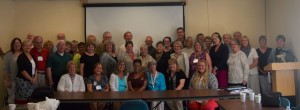 MISSION INTERPRETER COORDINATOR CONFERENCE: LOWC prepared a program and introduction to the work of the office for ELCA Mission Interpreters from across the church who met in New York on Aug. 28. Led by Christine Mangale, the group learned the basics about LOWC’s work and heard presentations from ecumenical colleagues and the International Organization for Migration on sustainable development, gender equality, and migratio
MISSION INTERPRETER COORDINATOR CONFERENCE: LOWC prepared a program and introduction to the work of the office for ELCA Mission Interpreters from across the church who met in New York on Aug. 28. Led by Christine Mangale, the group learned the basics about LOWC’s work and heard presentations from ecumenical colleagues and the International Organization for Migration on sustainable development, gender equality, and migratio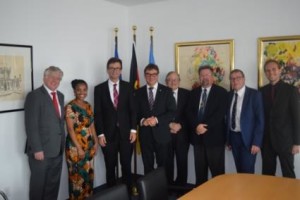 n and development, and toured the United Nations.
n and development, and toured the United Nations.
VISIT FROM THE EVANGELICAL CHURCH OF HESSEN AND NASSAU (Germany): At the end of the month, LOWC hosted a delegation from the Evangelical Church of Hessen and Nassau (EKHN) (Germany), led by its president, the Rev. Dr. Volker Jung. In addition to hearing about LOWC’s work, the group met with Ambassador Heiko Thoms (see photo, third from left), deputy permanent representative of Germany to the United Nations, and had lunch with the Rev. David Gaewski, conference minister for New York of the United Church of Christ, and ELCA Metropolitan New York Synod Bishop Robert Rimbo.
____________________
California
Mark Carlson
Lutheran Office of Public Policy
www.loppca.org
The Legislature returned from a month’s recess and will be completing its business in regular session on Sept. 11. There are also separate special sessions underway on transportation and health care funding. A priority for LOPP-CA is passage of ambitious, and contentious, carbon reduction goals (SB 350 and SB 32), and several Lutherans participated in an Aug. 25 lobby day organized by California Interfaith Power & Light and hosted by LOPP-CA at St. John’s Lutheran Church near the Capitol. The next day, more Lutherans participated in the Stronger California day focused on women’s economic equity and repeal of the Maximum Family Grant rule for CalWORKS/Temporary Assistance for Needy Families. The Rev. Leslie Welton of St. John’s and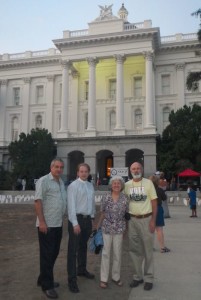 JoAnn Anderson of Incarnation Lutheran, Davis, were among those that met with Gov. Jerry Brown’s staff. On Sept. 2, a large Capitol rally and lobby day will show support for AB 953, a bill to address racial and identity profiling by law enforcement. LOPP-CA worked to connect PICO California, one of the rally organizers, with St. John’s Lutheran, which agreed to be the gathering place for hundreds of participants.
JoAnn Anderson of Incarnation Lutheran, Davis, were among those that met with Gov. Jerry Brown’s staff. On Sept. 2, a large Capitol rally and lobby day will show support for AB 953, a bill to address racial and identity profiling by law enforcement. LOPP-CA worked to connect PICO California, one of the rally organizers, with St. John’s Lutheran, which agreed to be the gathering place for hundreds of participants.
After viewing the webcast on racism by ELCA Presiding Bishop Elizabeth Eaton and William B. Horne II on Aug. 6 at St. John’s, LOPP-CA Director Mark Carlson, Conference Dean the Rev. Jason Bense, outgoing Sierra Pacific Synod Council member Joseph Husary, and synod anti-racism leader Jane Okubo participated in a candlelight vigil at the Capitol marking the 50th anniversary of the signing of the Voting Rights Act (see photo).
____________________
Colorado
Peter Severson, Lutheran Advocacy Ministry – Colorado
www.lam-co.org
HUNGER ADVOCACY: ELCA pastors and lay people participated in hearings around Colorado in August to advocate for better funding for child-nutrition programs and other anti-hunger efforts. The Colorado Department of Human Services hosted meetings on a listening tour of nine counties. Lutherans were present at hearings in Logan, Douglas, Kit Carson and La Plata counties to speak up about the realities of hunger in their communities. Lutheran Advocacy Ministry-Colorado is working with a coalition organized by Hunger Free Colorado to raise the profile of anti-hunger and nutrition programs around the state and to encourage people to tell stories about why these programs matter and how they make a difference in the lives of hundreds of thousands of Coloradans.
____________________
Minnesota
Tammy Walhof, Lutheran Advocacy – Minnesota
tammy@lcppm.org
AFFORDABLE HOUSING AND HOMELESSNESS: The Homes for All coalition heard proposals by members for legislation focused on seniors (the fastest growing group of homeless in Minnesota), and communities of color (dedicated state funding to increase housing options for households of color).
FINAL CLEAN POWER PLAN ANNOUNCEMENT: Director Tammy Walhof tweeted during President Obama’s live-stream Clean Power Plan briefing. LA-MN has also been part of many meetings and webinars to learn about and discuss the final plan.
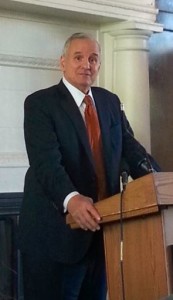 GOV. DAYTON: Minnesota Environmental Partnership featured the governor (see photo) at its annual meeting. He answered questions, including one from Tammy. He mentioned a Clean Power Plan letter signed by more than 300 faith leaders that LA-MN and MNIPL organized and encouraged continued action.
GOV. DAYTON: Minnesota Environmental Partnership featured the governor (see photo) at its annual meeting. He answered questions, including one from Tammy. He mentioned a Clean Power Plan letter signed by more than 300 faith leaders that LA-MN and MNIPL organized and encouraged continued action.
NORTHEASTERN MINNESOTA SYNOD CREATION CARE TEAM PLANNING DAY:Proposed pipeline routes will cross the synod and endanger water sources, prompting the team to action. They will also be promoting “Graceful Engagement on Difficult Issues” (based on training Tammy provided previously). New subcommittees include a group to help Tammy develop ideas for climate conversations starting from frames of hunger and poverty, water, coal, and clean energy.
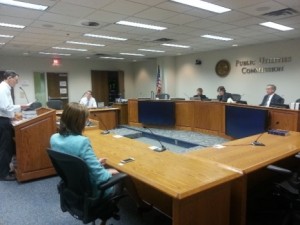 PUBLIC HEARING—PUBLIC UTILITLES COMMISSION: Tammy testified at the hearing, as did Diaconal Minister Mike Troutman (see photo). Breaks during the four-hour hearing allowed people to ask Tammy how their congregations can do more.
PUBLIC HEARING—PUBLIC UTILITLES COMMISSION: Tammy testified at the hearing, as did Diaconal Minister Mike Troutman (see photo). Breaks during the four-hour hearing allowed people to ask Tammy how their congregations can do more.
FACEBOOK: Tammy has been actively trying to increase LA-MN’s Facebook presence and has been testing issues and strategies. Lutherans, Christians of other backgrounds, and others are gradually finding the posts and page.
Twitter: @LuthAdvocacyMN Facebook
____________________
New Mexico
Ruth Hoffman, Lutheran Advocacy Ministry – New Mexico
www.lutheranadvocacynm.org
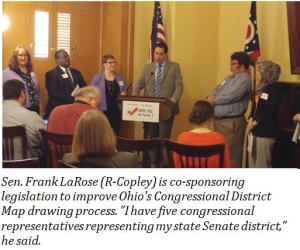 Lutheran Advocacy Ministry-NM Director Ruth Hoffman is serving on two task forces that are looking at housing issues. One task force is concerned with making supportive housing more available throughout New Mexico using the Housing First model, a proven approach that places chronically homeless people in supportive housing that is safe and affordable and then works with them to address the barriers that brought them to homelessness. The other task force is discussing alternatives for the mentally ill who have been arrested. Among the approaches that the group is looking at are better screening and treatment, alternative housing, and diversion programs. County jails have become de facto housing for people with mental illness who have been arrested for primarily minor crimes. Both task forces will be reporting to legislative interim committees this fall.
Lutheran Advocacy Ministry-NM Director Ruth Hoffman is serving on two task forces that are looking at housing issues. One task force is concerned with making supportive housing more available throughout New Mexico using the Housing First model, a proven approach that places chronically homeless people in supportive housing that is safe and affordable and then works with them to address the barriers that brought them to homelessness. The other task force is discussing alternatives for the mentally ill who have been arrested. Among the approaches that the group is looking at are better screening and treatment, alternative housing, and diversion programs. County jails have become de facto housing for people with mental illness who have been arrested for primarily minor crimes. Both task forces will be reporting to legislative interim committees this fall.
____________________
Ohio
Nick Bates, The Faith Coalition for the Common Good
nick@oneohionow.org
Nick Bates, diaconal minister in the Southern Ohio Synod, spoke on behalf of the Faith Coalition for the Common Good on Aug. 26 in support of State Issue 1—an effort to create more fair state legislative district lines. The amendment will require bi-partisan support for a legislative map, establish guiding principles for the maps, and be a more open process.
“We have the capacity in Ohio to do many great things, like end hunger, reduce poverty, and improve education for all of Ohio’s children,” Bates said.
That is why we encourage a YES vote in November to create a fair process for drawing Ohio legislative districts. Fair districts mean fair elections, and in turn that will lead to policies that are fairer to all Ohioans.
The press conference, in the Ladies Gallery at the Ohio Statehouse, coincided with a report released by the League of Women Voters highlighting how gerrymandered legislative districts have predicted nearly every election result in recent history. Ohioans 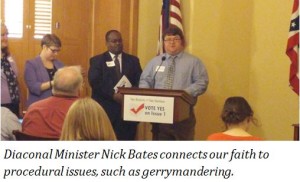 will have the opportunity to vote on the issue in November.
will have the opportunity to vote on the issue in November.
“As people of faith, we value community,” Bates said. “As the community of Ohio, we believe our governmental officials need to be accountable and connected to the community they serve.”
____________________
Pennsylvania
Amy Reumann, Lutheran Advocacy Ministry in Pennsylvania
Tracey DePasquale, Associate Director
www.lutheranadvocacypa.org
STATE BUDGET: Pennsylvania heads into September without a budget, which is now two months overdue. Democratic Gov. Tom Wolf and the Republican-led Legislature continue to wrestle primarily over major issues of education funding, public-pension system changes, the state liquor system and a severance tax on shale drilling. Non-profits are tracking the consequences of delay, and many school districts are faced with borrowing as they begin the year without state payments. Pennsylvania Lutherans continue to advocate for fair and adequate school funding and expansion of the state Housing Trust Fund.
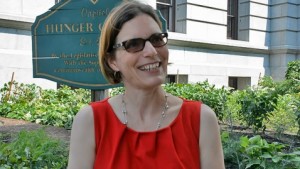 HUNGER AND ENVIRONMENT: Lutheran Theological Seminary in Philadelphia featured Director Amy Reumann and the work of LAMPa in an on-line video interview.
HUNGER AND ENVIRONMENT: Lutheran Theological Seminary in Philadelphia featured Director Amy Reumann and the work of LAMPa in an on-line video interview.
LAMPa continued to prepare congregations around the state to add their voices to “God’s work. Our hands.” Sunday with postcard campaigns for childhood nutrition and school funding. LAMPa Director Amy Reumann helped organize and participated in an Interfaith Climate Advocacy Training sponsored by Pennsylvania Interfaith Power and Light.
 MIGRATION: Associate Director Tracey DePasquale helped train volunteers for the immigration detainees visitation program, “Walking Together,” and connected LIRS to leaders looking to make York a “Welcoming Community.”
MIGRATION: Associate Director Tracey DePasquale helped train volunteers for the immigration detainees visitation program, “Walking Together,” and connected LIRS to leaders looking to make York a “Welcoming Community.”
Also in August: Lutheran hunger leaders and pastors from the Allegheny and Upper Susquehanna synods participated in a round table on the Child Nutrition Reauthorization held by congressman Glenn Thompson. Youth from St. Luke’s, Bloomsburg, visited with LAMPa to learn more about advocacy and tour the state Capitol. LAMPa had a display table at the Lower Susquehanna Synod Women of the ELCA gathering in Shippensburg.
____________________
Virginia
Charles Swadley
Virginia Interfaith Center for Public Policy
www.virginiainterfaithcenter.org
The Virginia Interfaith Center For Public Policy (VICPP) activities include:
- Sent action alerts on a number of federal policy issues, including feeding program reauthorization and economic policy, to approximately 10,000 statewide faith-based supporters.
- Organized and hosted two statewide educational webinars/teleconferences on the topic of redistricting in Virginia that attracted more than 125 participants. The events were produced in partnership with the Virginia Coalition for Immigrant Rights, New Virginia Majority, and One Virginia 2021.
- Organized and hosted a chapter meeting of American Families United, a national organization of families working to help improve immigration law.
- Hosted Virginia Department of Health for a policy and grassroots education planning sessions for nutritional and feeding programs.
- Exhibited at the Interfaith Center of Greater Richmond’s annual meeting.
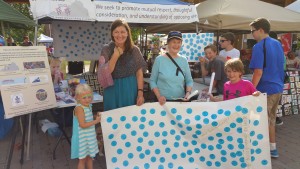 Hosted a table with our New River Valley Chapter at “Steppin’ Out” in downtown Blacksburg on Aug. 7 and 8 (see photo). Handed out more than 200 “Building Community” stickers. People filled in blanks on the stickers about what builds community. The stickers were intended to counter the pro-gun elements that permeate the event.
Hosted a table with our New River Valley Chapter at “Steppin’ Out” in downtown Blacksburg on Aug. 7 and 8 (see photo). Handed out more than 200 “Building Community” stickers. People filled in blanks on the stickers about what builds community. The stickers were intended to counter the pro-gun elements that permeate the event.- VICPP and Virginia Consumer Voices for Healthcare (VICPP’s healthcare advocacy program) attended and exhibited at Happily Natural Day on Aug. 29 and presented at the New River Valley Chapter’s annual “Coming Together to Make a Difference” of social justice organizations in Roanoke Valley on Aug. 30.
- Participated in planning meetings for an Anti-Poverty Summit to be held February 2016 in Hampton Roads in partnership with the Center for American Progress and a number of statewide organizations planning.
- Virginia Consumer Voices for Healthcare supported our Northern Va. Chapter’s organizing a Medicaid Expansion event on Sept. 10 in partnership with the League of Women Voters.
- Worked with Virginia United Methodist Conference leaders to plan for seven “Social Action 101: Effective Advocacy with the General Assembly” educational events to be held across Virginia in November.
- Chapter leaders, including Virginia Union Seminary faculty member, the Rev. Dr. Faith Harris, are working with the center to produce social justice and action coursework and workshops.
- Virginia Consumer Voices for Healthcare will be participating in Labor Day activities in the Hampton/Newport News area to celebrate the 50th anniversary of the Voting Rights Act.
____________________
Washington
Paul Benz, Faith Action Network
www.fanwa.org
POLICY UPDATES: The lead congressional issue for Faith Action Network (FAN) continues to be the reauthorization of our nation’s child-nutrition programs. We are supporting summer hunger reduction bills and urging support for all of this as we meet with members of congress and their staffs. We are also setting interim meetings with our state legislators in preparation for the next legislative session in January. Additionally, FAN is excited that all three of our ELCA bishops are going to Washington, D.C., for the congressional convocation with bishops of the Episcopal Church USA.
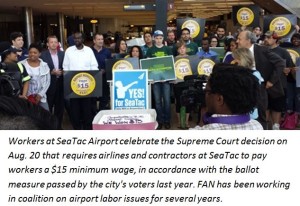 FAITH BASED ORGANIZING: FAN’s Network of Advocating Faith Communities (now at 101) is divided into 17 geographic clusters around our state. We are in FAN’s third programmatic season of gathering in cluster meetings to build relations between FAN and our advocates and their faith communities. We discuss FAN’s policy work as well as best practices for advocacy at the congregational level.
FAITH BASED ORGANIZING: FAN’s Network of Advocating Faith Communities (now at 101) is divided into 17 geographic clusters around our state. We are in FAN’s third programmatic season of gathering in cluster meetings to build relations between FAN and our advocates and their faith communities. We discuss FAN’s policy work as well as best practices for advocacy at the congregational level.
STAFFING: FAN is excited about our two new interns. One is an ELCA seminary student at Pacific Lutheran Theological Seminary and will be shared with an ELCA congregation two days a week. Our other new intern is from the United Church of Christ and will be at FAN four days a week. We also sadly say goodbye to Kelle Rose, who is moving on to graduate school—but welcome Erin Parks, who is a Pacific Lutheran University grad and recently spent a Lutheran Volunteer Corp year with the ELCA churchwide organization’s Justice for Women program.
____________________
Wisconsin
Cindy Crane, Lutheran Office for Public Policy in Wisconsin
www.loppw.org
DIALOGUE WITH BISHOPS: The director met with four bishops at a Region 5 meeting to review LOPPW’s priorities and resources and receive input and ideas for future priorities. They also discussed ways LOPPW could play a role in supporting and rejuvenating ELCA World Hunger teams in their synods.
CARE FOR CREATION/WATER CAMPAIGN: LOPPW and the South-Central Synod of Wisconsin began working together to create a team that will access resources from ELCA World Hunger and the Washington, D.C., Advocacy Office. The team will focus on the impact of climate change on water availability and hunger and the interrelatedness of the three.
TRAFFICKING: LOPPW is working with UW-Madison to secure an intern for 10 hours per week for one semester beginning this fall. The intern will work with the director and the LOPPW/Cherish All Children advocacy team to create resources for congregations.
MONEY IN POLTICS: The director discussed this as one of the root causes of hunger in relationship to public policy with the bishops and one legislator to prepare for part of the agenda of our September annual Advisory Council/Staff Retreat. More immediately, LOPPW will address the threat of dismantling our state’s Government Accountability Board.
TRAINING: The director participated in a one-week community organizing training hosted by the ELCA.
INTERFAITH: The director met with staff from the Wisconsin Council of Churches to begin discussions about partnering on a future project with a focus on a public policy.

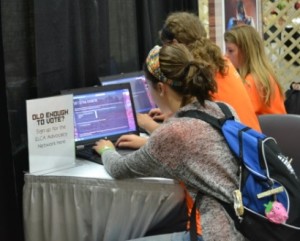 ADVOCACY AT THE ELCA YOUTH GATHERING: ELCA Advocacy joined with ELCA Young Adult Ministry for engagement and action at the ELCA Youth Gathering this July in Detroit. Youth took action in support of Child Nutrition reauthorization, called on the United States to lead in addressing climate change, and learned about how to continue connecting with the ELCA as young adults. We are excited to build our partnership with ELCA Young Adult Ministry by supporting efforts to foster connections and engage on important issues in our communities. Watch for important social media conversations by following @elcayoungadults and #elcayoungjustice!.
ADVOCACY AT THE ELCA YOUTH GATHERING: ELCA Advocacy joined with ELCA Young Adult Ministry for engagement and action at the ELCA Youth Gathering this July in Detroit. Youth took action in support of Child Nutrition reauthorization, called on the United States to lead in addressing climate change, and learned about how to continue connecting with the ELCA as young adults. We are excited to build our partnership with ELCA Young Adult Ministry by supporting efforts to foster connections and engage on important issues in our communities. Watch for important social media conversations by following @elcayoungadults and #elcayoungjustice!. CHILD NUTRITION REAUTHORIZATION: The Senate Finance committee will consider child nutrition program legislation starting Thursday, Sept. 17. This legislation will determine the continuation of cost-effective federal programs that are critical to the wellbeing of children in schools across the nation. Take action today to
CHILD NUTRITION REAUTHORIZATION: The Senate Finance committee will consider child nutrition program legislation starting Thursday, Sept. 17. This legislation will determine the continuation of cost-effective federal programs that are critical to the wellbeing of children in schools across the nation. Take action today to 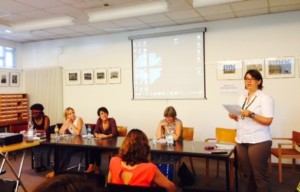 TRAINING WORKSHOP ON ADVOCACY FOR FAITH-BASED ORGANIZATIONS WITH A SPECIAL FOCUS ON WOMEN’S HUMAN RIGHTS: The Lutheran World Federation Women in Church and Society program organized a training workshop from July 6 to July 11 in Geneva on women’s human rights advocacy. It was held jointly with the World Council of Churches, Finn Church Aid, the ACT (Action by Churches Together) Alliance, and the World YWCA. The workshop’s aim was to help participants from member churches or other faith-based organizations to better understand and use U.N. mechanisms and treaties, such as the Convention on the Elimination of All Forms of Discrimination Against Women, the Universal Periodic Review, and the U.N. Commission on the Status of Women to advance gender quality. Submitting “shadow” reports is one of the avenues faith-based organizations can report on human rights situations in the countries being reviewed. The Lutheran Office for World Community’s Christine Mangale presented and moderated a workshop that explored the linkages between Convention on the Elimination of All Forms of Discrimination Against Women, the Universal Periodic Review and the proposed U.N.
TRAINING WORKSHOP ON ADVOCACY FOR FAITH-BASED ORGANIZATIONS WITH A SPECIAL FOCUS ON WOMEN’S HUMAN RIGHTS: The Lutheran World Federation Women in Church and Society program organized a training workshop from July 6 to July 11 in Geneva on women’s human rights advocacy. It was held jointly with the World Council of Churches, Finn Church Aid, the ACT (Action by Churches Together) Alliance, and the World YWCA. The workshop’s aim was to help participants from member churches or other faith-based organizations to better understand and use U.N. mechanisms and treaties, such as the Convention on the Elimination of All Forms of Discrimination Against Women, the Universal Periodic Review, and the U.N. Commission on the Status of Women to advance gender quality. Submitting “shadow” reports is one of the avenues faith-based organizations can report on human rights situations in the countries being reviewed. The Lutheran Office for World Community’s Christine Mangale presented and moderated a workshop that explored the linkages between Convention on the Elimination of All Forms of Discrimination Against Women, the Universal Periodic Review and the proposed U.N. 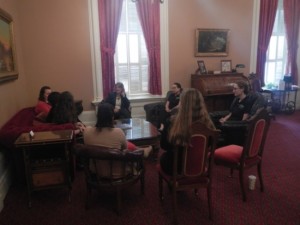 Director Mark Carlson’s activities included a half-day briefing by the California Pan-Ethnic Health Network (focus on health access for undocumented immigrants); attendance at the funeral of the Rev. Richard Bowley, a leader in justice and anti-racism ministry; anti-racism training offered by Faith Lutheran, Meadow Vista, and Bethlehem Lutheran, Auburn; panelist at a forum on police-community relations at Our Redeemer, Sacramento; and hosting a Day at the Capitol for participants in the Lutheran Episcopal Volunteer Network, sponsored by Lutheran Episcopal Campus Ministry at UC Davis (see photo with legislative director for Senate majority leader). A highlight was viewing a Senate hallway press conference by about eight senators who condemned the anti-immigrant rhetoric of Donald Trump.
Director Mark Carlson’s activities included a half-day briefing by the California Pan-Ethnic Health Network (focus on health access for undocumented immigrants); attendance at the funeral of the Rev. Richard Bowley, a leader in justice and anti-racism ministry; anti-racism training offered by Faith Lutheran, Meadow Vista, and Bethlehem Lutheran, Auburn; panelist at a forum on police-community relations at Our Redeemer, Sacramento; and hosting a Day at the Capitol for participants in the Lutheran Episcopal Volunteer Network, sponsored by Lutheran Episcopal Campus Ministry at UC Davis (see photo with legislative director for Senate majority leader). A highlight was viewing a Senate hallway press conference by about eight senators who condemned the anti-immigrant rhetoric of Donald Trump.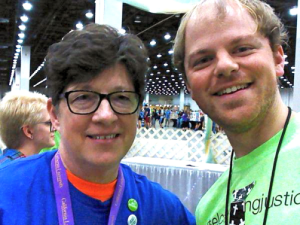 ELCA YOUTH GATHERING: Director Peter Severson was present at the Youth Gathering in Detroit to raise the profile of advocacy, partnering with ELCA Young Adult Ministry and ELCA World Hunger to create action stations in the Interaction Center. The advocacy offices in Colorado, Pennsylvania and Washington, D.C., were represented. Hundreds of youth and group leaders filled out child nutrition postcards for members of Congress and signed the Interfaith Climate Petition, and even Presiding Bishop Elizabeth Eaton came to visit us!
ELCA YOUTH GATHERING: Director Peter Severson was present at the Youth Gathering in Detroit to raise the profile of advocacy, partnering with ELCA Young Adult Ministry and ELCA World Hunger to create action stations in the Interaction Center. The advocacy offices in Colorado, Pennsylvania and Washington, D.C., were represented. Hundreds of youth and group leaders filled out child nutrition postcards for members of Congress and signed the Interfaith Climate Petition, and even Presiding Bishop Elizabeth Eaton came to visit us!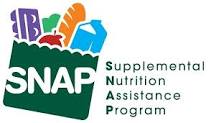 Lutheran Advocacy Ministry-New Mexico joined with many other groups and individuals to urge that new work requirements not be imposed for families receiving SNAP benefits. The Martinez administration through the New Mexico Human Services Department intends to institute work requirements for recipients from the age of 16 to 60 and for families with children over the age of 5. LAM-NM Director Ruth Hoffman was member of a panel that presented to the Legislative Health and Human Services Committee on July 16 in Las Cruces. Ruth emphasized that over 30 percent of New Mexico’s children live in poverty and that our economy is lagging far behind in the recovery from the great recession. She also stated that there is little or no evidence that the Human Services Department is prepared to or able to administer such a new program that will involve tens of thousands of recipients. Because LAM-NM now is in a covenant advocacy relationship with the NM Conference of Churches, LAM-NM spoke on behalf of that ecumenical organization as well.
Lutheran Advocacy Ministry-New Mexico joined with many other groups and individuals to urge that new work requirements not be imposed for families receiving SNAP benefits. The Martinez administration through the New Mexico Human Services Department intends to institute work requirements for recipients from the age of 16 to 60 and for families with children over the age of 5. LAM-NM Director Ruth Hoffman was member of a panel that presented to the Legislative Health and Human Services Committee on July 16 in Las Cruces. Ruth emphasized that over 30 percent of New Mexico’s children live in poverty and that our economy is lagging far behind in the recovery from the great recession. She also stated that there is little or no evidence that the Human Services Department is prepared to or able to administer such a new program that will involve tens of thousands of recipients. Because LAM-NM now is in a covenant advocacy relationship with the NM Conference of Churches, LAM-NM spoke on behalf of that ecumenical organization as well. 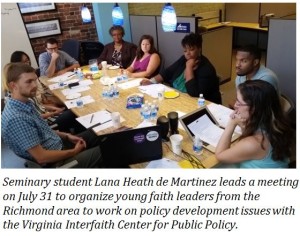 Seminary student and Public Policy Fellow Lana Heath de Martinez is leading VICPP’s organizing efforts to expand ethnic, age and faith diversity through the statewide chapters. VICPP is partnering with a new coalition of agencies called RISE for Youth with the intention of closing juvenile prisons in Virginia. A partnership with the Center for American Progress continues and will culminate with the co-hosting of a Poverty Summit in Hampton Roads in September.
Seminary student and Public Policy Fellow Lana Heath de Martinez is leading VICPP’s organizing efforts to expand ethnic, age and faith diversity through the statewide chapters. VICPP is partnering with a new coalition of agencies called RISE for Youth with the intention of closing juvenile prisons in Virginia. A partnership with the Center for American Progress continues and will culminate with the co-hosting of a Poverty Summit in Hampton Roads in September.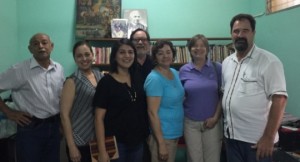 Mexico and Central America: This month, members of ELCA Advocacy and the churchwide organization staff traveled to Mexico to learn about the detainment and treatment of migrant children and families from Central America. Staff met with civil society leaders and government officials to learn more about the ongoing crisis.This visit came in the wake of the Obama administration’s ongoing foreign policy discussion that continues to focus on encouraging increased border security measures by the Mexican and Central American governments without acknowledging the immediate need to protect migrants who are forced to flee. ELCA Advocacy continues to urge lawmakers to
Mexico and Central America: This month, members of ELCA Advocacy and the churchwide organization staff traveled to Mexico to learn about the detainment and treatment of migrant children and families from Central America. Staff met with civil society leaders and government officials to learn more about the ongoing crisis.This visit came in the wake of the Obama administration’s ongoing foreign policy discussion that continues to focus on encouraging increased border security measures by the Mexican and Central American governments without acknowledging the immediate need to protect migrants who are forced to flee. ELCA Advocacy continues to urge lawmakers to  The Endangered Species Act: On June 25, ELCA Environmental Policy Director Mary Minette was on a panel of experts about our moral obligation to care for creation by protecting endangered species. The event was attended by Senate and coalition-partner staff. In her message, Mary reaffirmed our religious calling to be stewards of nature by caring for creatures and the environments around them. To protect God’s creation, we must make environment-friendly choices as well as advocate for continuing the Endangered Species Act, which is, as Mary put it, “a modern-day Noah’s ark.”
The Endangered Species Act: On June 25, ELCA Environmental Policy Director Mary Minette was on a panel of experts about our moral obligation to care for creation by protecting endangered species. The event was attended by Senate and coalition-partner staff. In her message, Mary reaffirmed our religious calling to be stewards of nature by caring for creatures and the environments around them. To protect God’s creation, we must make environment-friendly choices as well as advocate for continuing the Endangered Species Act, which is, as Mary put it, “a modern-day Noah’s ark.” On Friday following the Charleston massacre, LOPP-CA Director Mark Carlson attended a prayer service at Murph-Emmanuel AME (site of a former ELCA congregation) and left Bishop Eaton’s statement and spoke with the pastor of St. Andrew’s AME, the oldest AME church west of the Mississippi.
On Friday following the Charleston massacre, LOPP-CA Director Mark Carlson attended a prayer service at Murph-Emmanuel AME (site of a former ELCA congregation) and left Bishop Eaton’s statement and spoke with the pastor of St. Andrew’s AME, the oldest AME church west of the Mississippi. Learning about advocacy ministry: Youth from Peace and Trinity Lutheran churches in Las Cruces stopped at the Roundhouse, as the New Mexico state Capitol is nicknamed, on their “mystery trip.” LAM-NM Director Ruth Hoffman spoke to the group about advocacy ministry in a legislative committee room where they were able to sit in the legislators’ chairs and learn about how to be involved in advocacy. Ruth also took them on a tour of the Capitol. Thanks to Laura Carson, AIM and the Christian education and youth ministry director at Peace Lutheran for inviting LAM-NM to be a part of the adventure.
Learning about advocacy ministry: Youth from Peace and Trinity Lutheran churches in Las Cruces stopped at the Roundhouse, as the New Mexico state Capitol is nicknamed, on their “mystery trip.” LAM-NM Director Ruth Hoffman spoke to the group about advocacy ministry in a legislative committee room where they were able to sit in the legislators’ chairs and learn about how to be involved in advocacy. Ruth also took them on a tour of the Capitol. Thanks to Laura Carson, AIM and the Christian education and youth ministry director at Peace Lutheran for inviting LAM-NM to be a part of the adventure.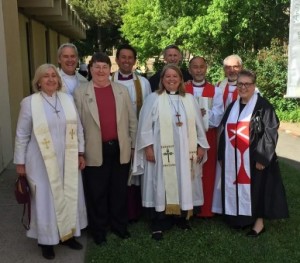 Ecumenical connections: Rocky Mountain Synod Bishop Jim Gonia and LAM-NM Director Ruth Hoffman were part of the ecumenical and interfaith attendees at the installation of the new archbishop of Santa Fe. The Most Rev. John C. Wester comes to the archdiocese from Salt Lake City where he served as bishop and worked in partnership with local ELCA pastors on issues of immigration and poverty. Utah is within the territory of the Rocky Mountain Synod so we look forward to continuing our partnership with Archbishop Wester.
Ecumenical connections: Rocky Mountain Synod Bishop Jim Gonia and LAM-NM Director Ruth Hoffman were part of the ecumenical and interfaith attendees at the installation of the new archbishop of Santa Fe. The Most Rev. John C. Wester comes to the archdiocese from Salt Lake City where he served as bishop and worked in partnership with local ELCA pastors on issues of immigration and poverty. Utah is within the territory of the Rocky Mountain Synod so we look forward to continuing our partnership with Archbishop Wester. As the July 1 budget deadline looms without promise of being met, Lutheran advocates are making their voices heard in the Capitol.
As the July 1 budget deadline looms without promise of being met, Lutheran advocates are making their voices heard in the Capitol.
 La Crosse Area Synod: “How to be an Advocate from a Faith Perspective,” co-led by the director and Council Member Bridget Crave.
La Crosse Area Synod: “How to be an Advocate from a Faith Perspective,” co-led by the director and Council Member Bridget Crave. Greater Milwaukee Synod: “Human Trafficking in our Backyard,” led by the director. The Assembly was held at Carthage College.
Greater Milwaukee Synod: “Human Trafficking in our Backyard,” led by the director. The Assembly was held at Carthage College.
 South-Central Synod: “Poverty and our State Budget,” co-led by the director and Council Member Lisa Hassenstab.
South-Central Synod: “Poverty and our State Budget,” co-led by the director and Council Member Lisa Hassenstab.
